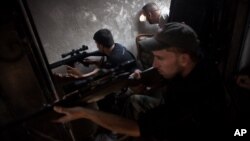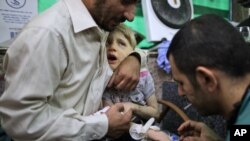Syrian rebels have posted an Internet video that appears to show the bodies of 20 soldiers whom they executed in the northern city of Aleppo.
In the video published Monday, the bodies of men dressed in military fatigues can be seen lined up on a pavement with their heads bloodied. The men were blindfolded and handcuffed. Rebels also can be heard calling the dead men "dogs." The British-based Syrian Observatory for Human Rights said the incident happened within the past few days.
U.N. officials have accused both Syrian government and rebel forces of committing atrocities in the country's civil war. Speaking in Geneva Monday, U.N. High Commissioner for Human Rights Navi Pillay urged the U.N. Security Council to refer Syria to the International Criminal Court, to ensure that all perpetrators of rights violations do not escape justice.
Also in Geneva, U.N. Secretary-General Ban Ki-moon rebuked the Security Council for failing to take a unified approach to ending the Syrian crisis. He said he is "deeply troubled by the aerial bombardments of civilians by government forces" in Syria, and he expressed concern at increasing sectarian tensions and the deteriorating humanitarian situation.
Ban urged nations and Syrians to support the diplomatic efforts of the new U.N.-Arab League envoy for the Syrian crisis, Lakhdar Brahimi. The envoy met with Egyptian and Arab League officials in Cairo on Monday.
Brahimi said his mission is "very difficult," but he promised he will give whatever assistance he can to the Syrian people. Asked if he would meet Syrian President Bashar al-Assad, Brahimi said: "I hope to, but I don't know."
In another development, one of the most prominent defectors from the Syrian government said he opposes foreign intervention in Syria. In an interview broadcast Monday on French television network BFM, former general Manaf Tlass said he believes Syrian rebels can topple the Assad government with the help of foreign supplies rather than direct intervention.
Tlas has been in exile in France since his defection in July. Some Syrian opposition figures remain suspicious of him because of his long service to Assad.
In the video published Monday, the bodies of men dressed in military fatigues can be seen lined up on a pavement with their heads bloodied. The men were blindfolded and handcuffed. Rebels also can be heard calling the dead men "dogs." The British-based Syrian Observatory for Human Rights said the incident happened within the past few days.
U.N. officials have accused both Syrian government and rebel forces of committing atrocities in the country's civil war. Speaking in Geneva Monday, U.N. High Commissioner for Human Rights Navi Pillay urged the U.N. Security Council to refer Syria to the International Criminal Court, to ensure that all perpetrators of rights violations do not escape justice.
Also in Geneva, U.N. Secretary-General Ban Ki-moon rebuked the Security Council for failing to take a unified approach to ending the Syrian crisis. He said he is "deeply troubled by the aerial bombardments of civilians by government forces" in Syria, and he expressed concern at increasing sectarian tensions and the deteriorating humanitarian situation.
Ban urged nations and Syrians to support the diplomatic efforts of the new U.N.-Arab League envoy for the Syrian crisis, Lakhdar Brahimi. The envoy met with Egyptian and Arab League officials in Cairo on Monday.
Brahimi said his mission is "very difficult," but he promised he will give whatever assistance he can to the Syrian people. Asked if he would meet Syrian President Bashar al-Assad, Brahimi said: "I hope to, but I don't know."
In another development, one of the most prominent defectors from the Syrian government said he opposes foreign intervention in Syria. In an interview broadcast Monday on French television network BFM, former general Manaf Tlass said he believes Syrian rebels can topple the Assad government with the help of foreign supplies rather than direct intervention.
Tlas has been in exile in France since his defection in July. Some Syrian opposition figures remain suspicious of him because of his long service to Assad.






